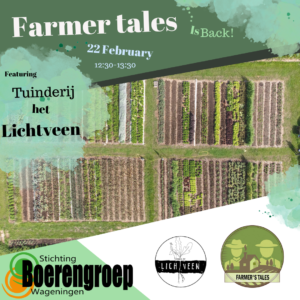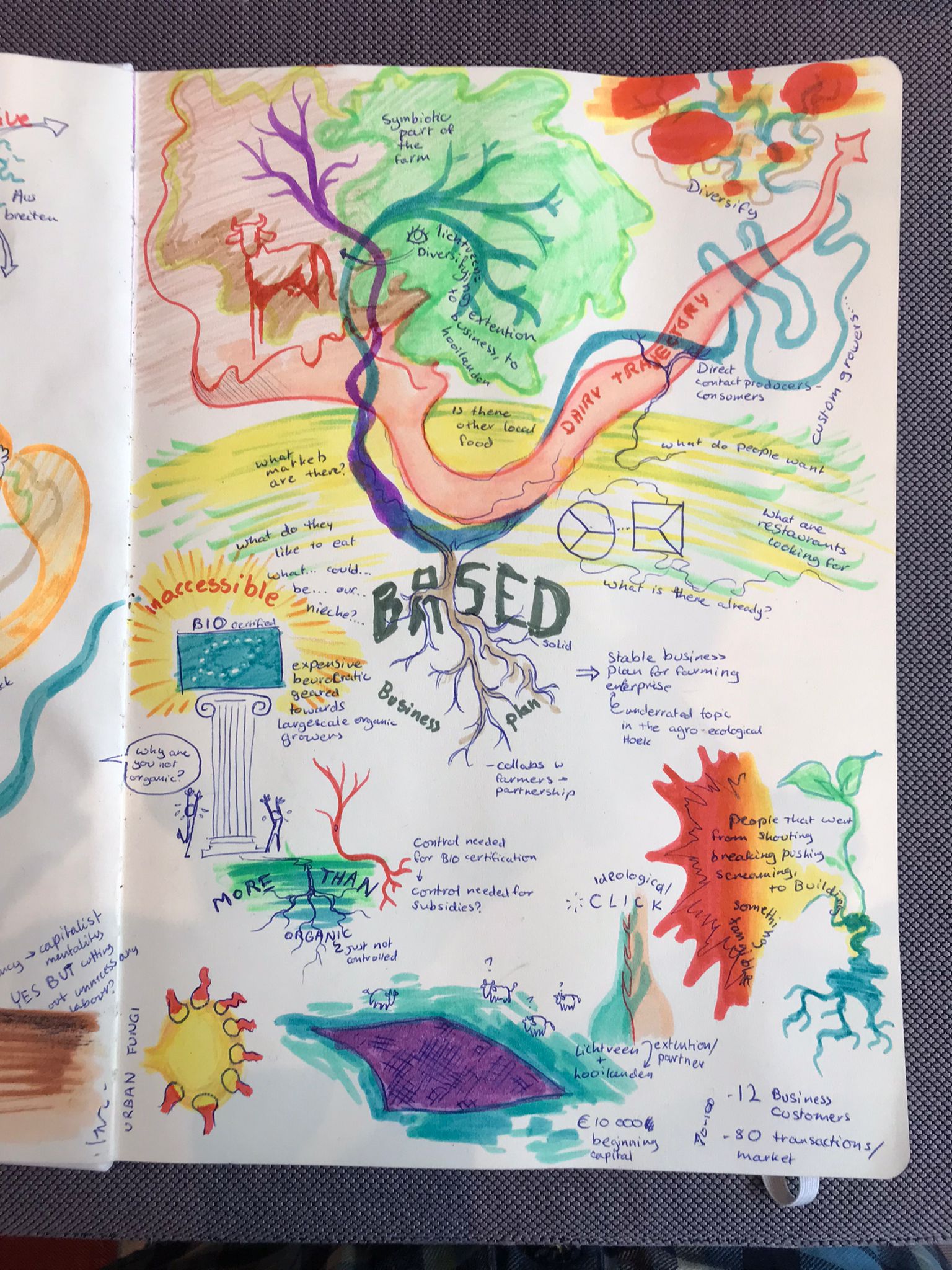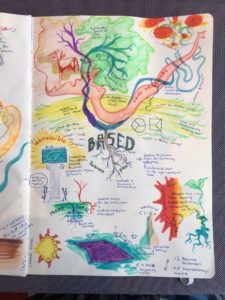 This page serves as notes for the Boerengroep Farmer’s Tale that took place on February 22nd, 2023. From Boerengroep, Rosh, Ruben and Daphne share their insights.
This page serves as notes for the Boerengroep Farmer’s Tale that took place on February 22nd, 2023. From Boerengroep, Rosh, Ruben and Daphne share their insights.
Chris Chancelor, who farms together with Pauline Martel at Tuinderij het Lichtveen, talked about his and Pauliene’s experience starting off as young farmers in the Netherlands. They worked together to set up an agroecological market garden in Wageningen and just completed their first growing season last year. Chris’ talk was about land access and how they got access to land as coming from a non-farming background, as well as how to create a sound business plan for a farming enterprise.
As visualized in Rosh’s beautiful drawing, het Tuinderij het Lichtveen is collaborating with farmers of the dairy farm called De Hooilanden, who see their initiative as an extension and means to diversify. This approach to getting access to land (contacting and collaborating with existing farms)- seems to be quite common for people who want to start a farming enterprise in the Netherlands. Due to this, existing farms that are approached may be quite cautious, which is why Chris emphasized that it is important to make sure that values are shared and that there is a solid business plan. A good business plan requires having a very good idea of the surrounding context; knowing things like what people want and are willing to pay for, what’s already there, potential business partners, etc.
Next to making a solid business plan, Chris mentioned other practical aspects to make a small farm work. Firstly, he emphasized that to start a small farm, you should have at least some prior experience in farming. Preferably, this is by internships at a few different farms. Furthermore, some entrepreneurial experience, or at least an entrepreneurial spirit is necessary. Also, a network of people with different skills is important, as you can always talk to them if you need help with something outside of your expertise. Support and collaboration with another existing farm can also be very beneficial. And if you want to start a farm with someone else, as was the case with Chris and Pauline, it is important to have a good click and a similar vision.
Part of the conversation about how to create a healthy farming enterprise also touched on trust, certification, and subsidies (and funding). Tuinderij Het Lichtveen does not use subsidies. In part on ideological grounds, as Chris and Pauline want to be an example of that it is possible to have a functional, healthy, small scale agro-ecological market garden. Another problem for certification is that getting access to organic certification is a time-consuming and expensive process. It is still geared towards large-scale, specialized production. This is due to requirements such as keeping invoices and records for any cultivated crop varieties, of which Chris and Paulina have over a hundred. This level of administration is difficult to manage for a highly diverse farming system such as theirs.
Other topics touched on during the conversations were the use of low-cost solutions on the farm, distribution of the vegetables to the customers and how Chris and Pauline started setting up their field. Creating beds under an agricultural tarp that was spread out in the meadow among the dairy cows and following that with covering the bare soil with cardboard and 10 cm of fresh compost. He also talked about their roles as change makers, and the impact they wanted to achieve with what they do.
Rather than depending on financial institutions, Chris and Pauline saved up and both contributed equally to the starting capital of 10,000 euros. In their organization, they are equal shareholders and also distribute the workload among themselves based on trust and energy capacity. They organize in this way to foster a ‘solidarity feeling’ among themselves.
Also, in their collaboration with the farmers at Hooilanden, Chris and Pauline work to maintain a strong relationship with an attitude of commitment and openness – the well though-out business plan being a means to convey this. This allows them to build trust for a long-term collaboration (3-year lease of the land with hope to continue) and to put up low-cost long-term infrastructure such as irrigation and a nursery tunnel. They also ingeniously crafted an incubator from an old freezer and rice cooker!
Finally, Chris and Pauline work to re-define how relationships to consumers and other farmers should look like. A majority of their produce goes to local chefs who wish to work with fresh and local ingredients in their restaurants. Furthermore, they are part of the local producers’ organization StreekWaar and supply their goods directly to the citizens of Wageningen on the Saturday Market. Chris explains their participation in StreekWaar as a means to relate to other farmers not as competitors, but as collaborators. This means they actively create an alternative to the neoliberal notion of efficiency through competition. For at StreekWaar, the collaborating producers are still able to provide affordable and healthy food to us, citizens of Wageningen.
We are grateful for Chris to come to Wageningen Campus and share his insights with us. We hope that for our readers, this inspires and provides lessons to consider should they want to set up an agroecological farm themselves. For what first and foremost became clear is that it is possible for new farmers to start farming agroecologically and relate differently! So thank you Chris, we wish you only good growing seasons for the future.
If anyone wishes to meet Chris and Pauline, they can occasionally be found at the StreekWaar Market Stand. Or on April 15, 2023, there is an open day on their farm. Check out their website: https://www.lichtveen.nl/


